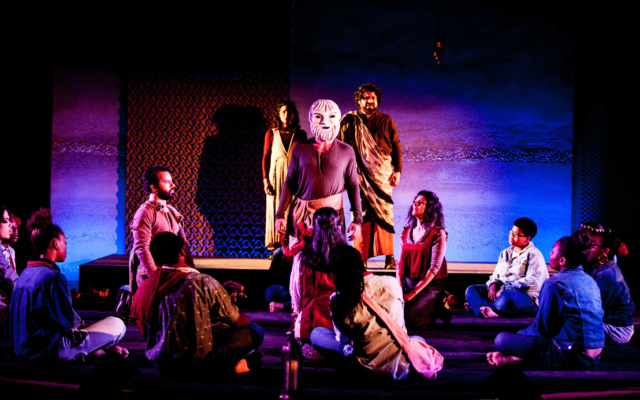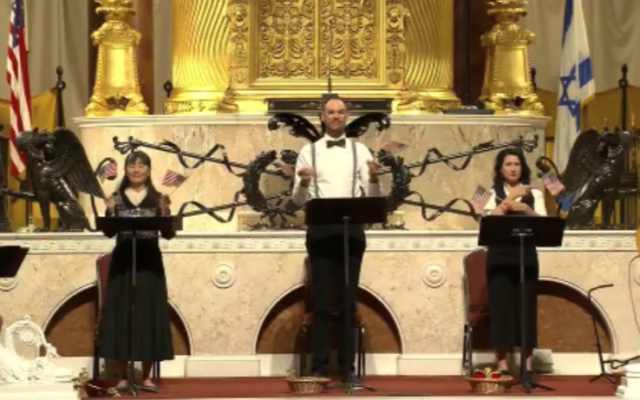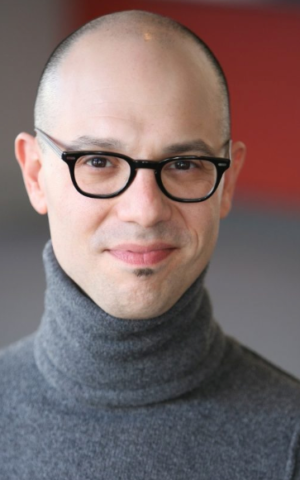The Temple & Breman Museum Host ‘theatre dybbuk’
Week-long residency features works by the Los Angeles theater company and educational seminars.

The main sanctuary of The Temple in Midtown became a stage as theatre dybbuk settled in for a one-week residency that began Jan. 31.
Based in Los Angeles, theatre dybbuk describes itself as a creator of “provocative new works” that blend theater with other art forms.
The theater company, in keeping with its unconventional approach to drama, used the ornate bimah of The Temple, with its intricate iron work and gilded Ark, for a performance of “breaking protocols,” that lampooned the notorious forgery, “The Protocols of the Elders of Zion.” This “Protocols” was a forgery that was first published in Russia soon after the turn of the 20th century, and was reputed to be the transcripts of a secret cabal of Jewish leaders bent on world domination.
In the hands of theatre dybbuk it became the basis for a comic performance that, at one time, had a member of the theater company pantomiming, while fully dressed on the makeshift temple stage. The founder and artistic director of theatre dybbuk, Aaron Henne, explained it is all part of the theatrical experience.
“Because we were dealing with the possible author of the “Protocols,” we were kind of stripping him bare, as he was putting forth his ideas about the protocols and saying aloud where they come from and how they operate. We are using that theatrical technique of burlesque, strip tease or exotic dance, [and] reveal this human being who has his own motivations and resentments that are driving him.”

The jarring juxtaposition of the words of the published work, which inspired the Nazis and other antisemitic conspiracy seekers, with The Temple setting, was in keeping with the approach that the theater company has cultivated since its founding almost a dozen years ago. Theatre director Henne describes it as way of getting his audiences to actively pay attention to group performances.
“We present work that asks you to lean in, to pay attention, to have to process what is being said. If you turn away for a moment, you might miss something. That’s what our whole approach is about requiring something of the audience, not just the old like ‘go to the movies, sitting back and enjoy the show.’ We have the opposite approach. We want you here as a participant.”
LA’s theatre dybbuk takes its name from the supernatural spirit that has the power to possess Jewish souls. It was first popularized in the well-known classic of the Yiddish theater, “The Dybbuk.” For Henne, it became a way to remind his audiences that they could possibly also be ‘possessed’ during the company’s performances.

“This idea of something that has sort of possessed you is moving through you, that resonates in you is part of what we are after. We’re engaging with folkloric mythic questions, questions of darkness and questions of difficulty in a variety of ways.”
In a second performance before a mid-afternoon audience on Feb. 5 at The Breman Museum, troupe previewed material from “The Merchant Project,” an exploration of Shakespeare’s “The Merchant of Venice” that is said to explore the nature of truth and how it comes to be accepted on the stage and in our lives.
“I think what we’re wrestling with in the show is the question of what do people do with their anxieties in a changing world and how do they maybe displace those anxieties about the quote unquote ‘other,’” Henne says. “Shakespeare’s day in the late 16th century in England was a very difficult period and difficult in ways that also reflect or mirror today.”
The Breman audience had a chance to sit in on a session that illustrated how the company creates its new work and to question the creative team about that process. The work will have its world premiere on the West Coast in May.
During its week-long residency, the group also held workshops and professional development classes at The Weber School and The Davis Academy and for students and staff in The Temple’s educational program that, according to Henne, brought theater into the educational process.
“We’re bringing in storytelling techniques that add power to the curriculum’s power. We ask students and teachers how they can align their own life and their own story and their own experiences with what is being taught. We feel that it doesn’t feel alienating and separate if you can bring yourself to it.”
The visit to Atlanta by theatre dybbuk was underwritten by a grant from the Covenant Foundation in New York that will bring performances and theater company to six cities over the next three years.



comments